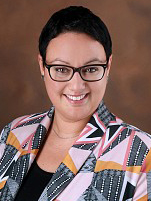Home » News » Introducing ‘Race, Place and Power’
Introducing ‘Race, Place and Power’
Posted by anderc8 on Monday, January 8, 2018 in News, Race, Place and Power.

Assistant Professor of English Marzia Milazzo
Written by Assistant Professor of English Marzia Milazzo
I am excited to begin teaching Race, Place and Power, a new multicultural University Course being offered by Vanderbilt for the first time this spring. The course will examine the crucial entanglement between race and place from an interdisciplinary and international perspective. We will pay specific attention to three different national contexts—Brazil, South Africa and the United States—that have long been privileged sites for the comparative study of racism in history and the social sciences, yet are rarely brought together in the classroom.
We aim to answer several key questions throughout the semester, such as:
- What is racism and its social function?
- What is the purpose of spatial segregation?
- How are the spatial dynamics of race similar or different in Brazil, the United States and South Africa?
- How do the antiracist politics articulated in the works examined intersect with women’s rights, LGBTQ rights, immigrant rights, human rights and resistance to global capitalism and the neoliberal order?
- What do these works tell us about the legacies of colonialism in our time, and what do they suggest about the relationship between writing, colonialism and decolonization?
In the process, we will examine how and why what appear to be vastly different racial regimes and historical contexts produce strikingly similar socio-political and economic outcomes.

Students will learn that racism is produced and reproduced through a differential access to space. Colonialism was about the theft of land and the exploitation of free or cheap labor, and these realities persist today. It is important to understand that racism is not merely a matter of individual prejudice, but is institutionalized and affects every facet of our lives – even the air we breathe. For example, the air is cleaner in the predominantly white neighborhood of Sylvan Park than in North Nashville, where the majority of Black Nashvillians live. Racism cannot be redressed without breaking the bond between race and place: spatial desegregation is fundamental.
Experiential learning will be an important aspect of this course. In addition to studying literary texts, academic scholarship, film, music, documentary and news media, students will interact with and learn from local and international artists, activists, writers and scholars. In February, for example, we will visit The Hermitage, accompanied by archaeologist Larry McKee. In March, we’ll meet local artist Omari Booker at his studio, where we will learn about his collection of paintings, including his new series about North Nashville and its vibrant community titled “I Live Here.” Also in March, we will attend the Jefferson Street Art Crawl, which occurs the fourth Saturday of every month. There, we will meet with teacher, performer and activist Joseph Bazelais, the project manager for the art crawl as well as the founder of Televise the Movement, a grassroots media company committed to sharing the untold stories of communities of color. Students will also conduct their own research about a place of their choice in Nashville and will critically engage their own positionality within that space in a final creative project.
Be sure to return to the blog often throughout the semester for entries authored by students.
